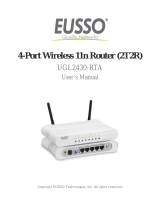
5.14.6 Reboot ................................................................................................................107
5.14.7 Password ............................................................................................................108
5.14.8 System Log .........................................................................................................108
5.14.9 Statistics ..............................................................................................................109
Chapter 6. Configuration for Repeater Mode ............................................................................... 111
6.1 Login ............................................................................................................................... 111
6.2 Status .............................................................................................................................. 111
6.3 Quick Setup ..................................................................................................................... 112
6.4 Working Mode ................................................................................................................. 113
6.5 Network ........................................................................................................................... 113
6.5.1 LAN ..................................................................................................................... 114
6.6 Wireless .......................................................................................................................... 114
6.6.1 Wireless Settings ................................................................................................ 115
6.7 DHCP .............................................................................................................................. 116
6.7.1 DHCP Settings .................................................................................................... 116
6.7.2 DHCP Clients List ............................................................................................... 118
6.7.3 Address Reservation .......................................................................................... 118
6.8 System Tools ...................................................................................................................120
6.8.1 Diagnostic ...........................................................................................................120
6.8.2 Firmware .............................................................................................................122
6.8.3 Factory Defaults..................................................................................................123
6.8.4 Backup & Restore ...............................................................................................124
6.8.5 Reboot ................................................................................................................124
6.8.6 Password ............................................................................................................125
6.8.7 System Log .........................................................................................................126
Chapter 7. Configuration for Bridge Mode ...................................................................................127
7.1 Login ...............................................................................................................................127
7.2 Status ..............................................................................................................................127
7.3 Quick Setup .....................................................................................................................129
7.4 Working Mode .................................................................................................................129
7.5 Network ...........................................................................................................................130
7.5.1 LAN .....................................................................................................................130
7.6 Wireless ..........................................................................................................................131
- IV -




















